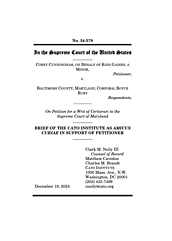Learn more about Cato’s Amicus Briefs Program.
On August 1, 2016, two Baltimore County police officers arrived at the apartment of Korryn Gaines to serve misdemeanor arrest warrants for her failure to appear in court for alleged traffic violations and an assault charge. The officers knocked on the door and announced their presence. No one opened the door. Hearing people moving inside, the officers kicked down the door and entered the apartment to find Ms. Gaines sitting on the floor with a shotgun in her lap. The officers immediately exited the residence and called for backup, leaving Ms. Gaines inside with her five-year-old son, Kodi. Around this time, the officers learned that Ms. Gaines was struggling with mental illness and was not taking her prescribed medication.
More than 30 armed officers and counter-snipers surrounded the apartment, taking up positions in and around the building. They held their positions for six hours in sweltering heat, which was made even more oppressive by the police’s decision to cut power to Ms. Gaines’s apartment.
Around the six-hour-and-45-minute mark, Ms. Gaines walked into the kitchen to make her son a sandwich. She brought Kodi with her, along with her gun, which she did not point at anyone. It was at this point that Corporal Ruby, who could only see Ms. Gaines’s braided hair and the barrel of her weapon, took a head shot through the dry wall of the kitchen. Ruby knew that Kodi was present, though not visible, and further admitted to knowing it was possible that the bullet could strike him.
The bullet struck Ms. Gaines in the back before ricocheting off the refrigerator and hitting Kodi in the cheek. Ruby then proceeded to enter the apartment where he shot Ms. Gaines three more times, killing her. He also stuck Kodi again, this time in the elbow.
These injuries forced Kodi to undergo multiple surgeries to remove the bullet fragments from his face and repair his elbow. After the incident, a witness testified that Corporal Ruby justified his conduct because he was “hot and frustrated.”
Kodi was an innocent and unarmed bystander with the constitutional right to be free from arbitrary state action. The officer’s conscience-shocking misconduct obviously violated Kodi’s rights. Kodi’s father, Corey Cunningham, sued Baltimore County for violating his son’s rights and obtained a favorable jury verdict of over $30 million.
On appeal, though, the Maryland Supreme Court reversed, holding that the officer was entitled to qualified immunity. It held that the officer lacked “sufficiently clear” guidance from prior cases that the shooting would violate Kodi’s rights. Kodi’s father is now appealing to the U.S. Supreme Court.
Cato filed an amicus brief asking the Supreme Court to grant Mr. Cunningham’s petition and reverse the decision below. In cases of obvious rights violations—like the unjustified shooting of a child due to an officer’s personal frustration—no caselaw is necessary to “clearly establish the law.” This “obviousness” principle ensures that officers do not escape accountability simply because their conduct—in the words of then-Judge Gorsuch—“is so flagrantly unlawful that few dare its attempt.”
The Court should not tolerate the continued over application of qualified immunity but should instead vindicate the rights of Kodi and other Americans harmed by flagrant governmental misconduct.

This work is licensed under a Creative Commons Attribution-NonCommercial-ShareAlike 4.0 International License.


